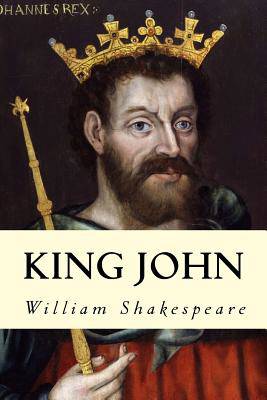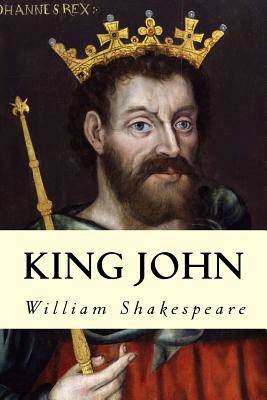
- Afhalen na 1 uur in een winkel met voorraad
- Gratis thuislevering in België vanaf € 30
- Ruim aanbod met 7 miljoen producten
- Afhalen na 1 uur in een winkel met voorraad
- Gratis thuislevering in België vanaf € 30
- Ruim aanbod met 7 miljoen producten
Zoeken
Omschrijving
King John, a history play by William Shakespeare, dramatises the reign of John, King of England(ruled 1199-1216), son of Henry II of England and Eleanor of Aquitaine and father of Henry III of England. It is believed to have been written in the mid-1590s but was not published until it appeared in the First Folio in 1623. King John receives an ambassador from France, who demands, on pain of war, that he renounce his throne in favour of his nephew, Arthur, whom the French King, Philip, believes to be the rightful heir to the throne. John adjudicates an inheritance dispute between Robert Faulconbridge and his older brother Philip the Bastard, during which it becomes apparent that Philip is the illegitimate son of King Richard I. Queen Eleanor, mother to both Richard and John, recognises the family resemblance and suggests that he renounce his claim to the Falconbridge land in exchange for a knighthood. John knights the Bastard under the name Richard. In France, King Philip and his forces besiege the English-ruled town of Angiers, threatening attack unless its citizens support Arthur. Philip is supported by Austria, who is believed to have killed King Richard. The English contingent arrives; Eleanor trades insults with Constance, Arthur's mother. Kings Philip and John stake their claims in front of Angiers' citizens, but to no avail: their representative says that they will support the rightful king, whoever that turns out to be. The French and English armies clash, but no clear victor emerges. Each army dispatches a herald claiming victory, but Angiers' citizens continue to refuse to recognize either claimant because neither army has proven victorious. The Bastard proposes that England and France unite to punish the rebellious citizens of Angiers, at which point they propose an alternative: Philip's son, Louis the Dauphin, should marry John's niece Blanche, a scheme that gives John a stronger claim to the throne, while Louis gains territory for France. Though a furious Constance accuses Philip of abandoning Arthur, Louis and Blanche are married. Cardinal Pandolf arrives from Rome bearing a formal accusation that John has disobeyed the pope and appointed an archbishop contrary to his desires. John refuses to recant, whereupon he is excommunicated. Pandolf pledges his support for Louis, though Philip is hesitant, having just established family ties with John. Pandolf brings him round by pointing out that his links to the church are older and firmer. War breaks out; Austria is beheaded by the Bastard in revenge for his father's death; and both Angiers and Arthur are captured by the English. Eleanor is left in charge of English possessions in France, while the Bastard is sent to collect funds from English monasteries. John orders Hubert to kill Arthur. Pandolf suggests to Louis that he now has as strong a claim to the English throne as Arthur (and indeed John), and Louis agrees to invade England. Hubert finds himself unable to kill Arthur. John's nobles urge Arthur's release. John agrees, but is wrong-footed by Hubert's announcement that Arthur is dead. The nobles, believing he was murdered, defect to Louis' side. The Bastard reports that the monasteries are unhappy about John's attempt to seize their gold. Hubert has a furious argument with John, during which he reveals that Arthur is still alive. John, delighted, sends him to report the news to the nobles. Arthur dies jumping from a castle wall. (It is open to interpretation whether he deliberately kills himself or just makes a risky escape attempt.) The nobles believe he was murdered by John, and refuse to believe Hubert's entreaties. John attempts to make a deal with Pandolf, swearing allegiance to the Pope in exchange for Pandolf's negotiating with the French on his behalf. John orders the Bastard, one of his few remaining loyal subjects, to lead the English army against France.
Specificaties
Betrokkenen
- Auteur(s):
- Uitgeverij:
Inhoud
- Aantal bladzijden:
- 82
- Taal:
- Engels
Eigenschappen
- Productcode (EAN):
- 9781500406240
- Verschijningsdatum:
- 4/07/2014
- Uitvoering:
- Paperback
- Formaat:
- Trade paperback (VS)
- Afmetingen:
- 152 mm x 229 mm
- Gewicht:
- 122 g

Alleen bij Standaard Boekhandel
+ 19 punten op je klantenkaart van Standaard Boekhandel
Beoordelingen
We publiceren alleen reviews die voldoen aan de voorwaarden voor reviews. Bekijk onze voorwaarden voor reviews.











